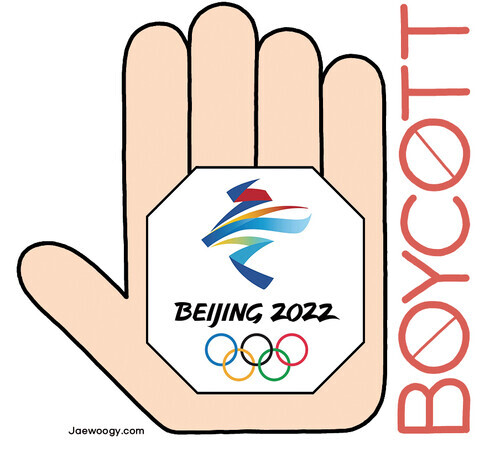hankyoreh
Links to other country sites 다른 나라 사이트 링크
[Column] Politics of Olympics

A debate is already brewing about a boycott of the 2022 Winter Olympics, which will be held in Beijing on Feb. 4, 2022. After a US State Department spokesperson courted controversy with remarks suggesting that the US and its allies would discuss boycotting the Beijing Winter Olympics, the White House press secretary sought to defuse the situation by saying that “we have not discussed, and are not discussing, any joint boycott.”
But while the US government may not be currently discussing the boycott, the embers of the boycott debate continue to glow.
In February, 180 international human rights organizations published an open letter calling for the boycott of the Beijing Winter Olympics amid growing allegations that the Chinese government is committing human rights violations against the Uighur minority in Xinjiang, sending them to concentration camps for reeducation and subjecting them to slave labor.
Canada’s House of Commons unanimously passed a motion calling for the International Olympic Committee (IOC) to move the Winter Olympics away from Beijing. Meanwhile, some in Europe are arguing against repeating their error of tolerating the Berlin Olympics in 1936, which ended up being a propaganda coup for Germany’s Nazi Party.
The IOC and the US Olympic and Paralympic Committee are opposed to an Olympic boycott, which they describe as an outdated relic of the Cold War era. They have said that athletes shouldn’t be used as “political pawns.”
The US and South Korea were among 66 countries that boycotted the Moscow Olympics in 1980 to protest the Soviet Union’s invasion of Afghanistan in 1979. But Olympic officials pointed out that the boycott did little to resolve the situation in Afghanistan.
More recently, support has been growing for a “partial boycott” or a “diplomatic boycott,” rather than a complete boycott, which would rob athletes of opportunities they’ve worked so hard to gain.
Mitt Romney, former presidential candidate for the Republican Party, argued in an opinion piece in the New York Times last month that American athletes should be allowed to compete in the Olympics, but that senior officials and diplomats from the US government should stay away from the opening and closing ceremonies and American companies should decline to sponsor the games. Romney said that would be a way to “demonstrate our repudiation of China’s abuses [and] hurt the Chinese Communist Party rather than our American athletes.”
Romney’s proposal is reminiscent of the Obama administration’s decision not to send an official government delegation to the 2014 Winter Olympics, held in Sochi, Russia.
While critics of an Olympic boycott say that such a move politicizes sports, the Olympics have always been political. That’s particularly true of the upcoming Beijing Olympics.
This year, Chinese President Xi Jinping will celebrate the 100th anniversary of the establishment of the Chinese Communist Party (CCP); next year, he hopes to highlight the “great rise of the Chinese nation” to the whole world. That’s a prelude to his attempt to embark upon a third term in office, shattering China’s previous limit of two terms at the CCP’s National Congress at the end of 2022.
The success of the Beijing Olympics is critical to Xi holding on to power in China. If Biden or some other senior American official attends the Beijing Winter Olympics, his administration will surely be slammed for legitimizing China’s human rights violations and face major political fallout in the midterm elections scheduled for the end of 2022.
In the end, the US will probably try to organize a “diplomatic boycott” with its allies. That will prompt harsh retaliation from China, which will pressure American allies and corporations seeking to back out of Olympic sponsorship deals.
This is just one more diplomatic challenge for South Korea to deal with.
By Park Min-hee, editorial writer
Please direct comments or questions to [english@hani.co.kr]

Editorial・opinion
![[Column] Will Seoul’s ties with Moscow really recover on their own? [Column] Will Seoul’s ties with Moscow really recover on their own?](https://flexible.img.hani.co.kr/flexible/normal/500/300/imgdb/original/2024/0513/5917155871573919.jpg) [Column] Will Seoul’s ties with Moscow really recover on their own?
[Column] Will Seoul’s ties with Moscow really recover on their own?![[Column] Samsung’s ‘lost decade’ and Lee Jae-yong’s mismatched chopsticks [Column] Samsung’s ‘lost decade’ and Lee Jae-yong’s mismatched chopsticks](https://flexible.img.hani.co.kr/flexible/normal/500/300/imgdb/original/2024/0512/3017154788490114.jpg) [Column] Samsung’s ‘lost decade’ and Lee Jae-yong’s mismatched chopsticks
[Column] Samsung’s ‘lost decade’ and Lee Jae-yong’s mismatched chopsticks- [Correspondent’s column] The real reason the US is worried about Chinese ‘overcapacity’
- [Editorial] Yoon’s gesture at communication only highlights his reluctance to change
- [Editorial] Perilous stakes of Trump’s rhetoric around US troop pullout from Korea
- [Guest essay] Preventing Korean Peninsula from becoming front line of new cold war
- [Column] The state is back — but is it in business?
- [Column] Life on our Trisolaris
- [Editorial] Penalties for airing allegations against Korea’s first lady endanger free press
- [Editorial] Yoon must halt procurement of SM-3 interceptor missiles
Most viewed articles
- 1[Column] Samsung’s ‘lost decade’ and Lee Jae-yong’s mismatched chopsticks
- 2Ado over Line stokes anti-Japanese sentiment in Korea, discontent among Naver employees
- 3Korean opposition decries Line affair as price of Yoon’s ‘degrading’ diplomacy toward Japan
- 4US has always pulled troops from Korea unilaterally — is Yoon prepared for it to happen again?
- 5Shuttering all foreign worker support centers, S. Korea leaves migrants to fend for themselves
- 6Korean auto industry on edge after US hints at ban on Chinese tech in connected cars
- 7[Photo] Korean students protest US complicity in Israel’s war outside US Embassy
- 8Gangnam murderer says he killed “because women have always ignored me”
- 9Korean med schools swallow bitter pill by pushing back classes to avoid mass flunking
- 10USFK sprayed defoliant from 1955 to 1995, new testimony suggests